#leigh bardugo critical
Text
I always thought that the reason I never found Malina appealing was because as soon as we're introduced to the story they're both joined at the hip from the very start, leaving no room for anymore development or any drama in their relationship for the reader to get invested in and also because growing up together and sharing the same mother figure gives them a more platonic vibe BUT I was wrong! The major factor why I cannot stand that ship is because Mal represents regression in Alina's story. He is the biggest obstacle in her personal growth and letting go of him is what makes her glow, literally and figuratively. She did NOT need him in her story and the author knew this too which is why she made a very conscious decision to constantly make Alina smaller for him so he can be more relevant. And THIS is what makes me loathe the ship.
#shadow and bone#alina starkov#anti mal oretsev#anti malina#leigh bardugo critical#ruin and rising#posts#mine my own
83 notes
·
View notes
Note
🔥 Aleksander's mommy issues and if that plays a role in his relationships
I will say until I die that aleksander's relationships with others are defined by his relationship with immortality and thus with his mother - who not only taught him everything about it, but who has also been the only consistent presence in his life for over four hundred years. this is the woman that developed an emotionally codependent and incestuous relationship with him as well as groomed him into the type of man she would wish to have a partnership with, which further defines the ways he views himself, the world, other people, and his connections to them.
all of this correlates to his many relationships, but especially his romantic one with alina. he mirrors his traumas with his mother and therefore with eternity in his dynamic with her. he is simultaneously the perpetrator and the victim. where he spent hundreds of years forgiving his mother for her abuse of him because the alternative is eternal loneliness, he expects of alina the same level of forgiveness for his actions based on that same latent despair - because he was taught at a fundamental age that a dichotomy exists in the universe, and the only way to find anything good at all - safety or happiness or connection - is to center all needs around the threat of inevitable punishment. not punishment in any physical sense, but punishment at a transcendental level.
the reason baghra did this was to groom him. the reason any parent does this (and it is especially prevalent with religion and cults) is to control their children and guide them toward the ideal path (which is always the path they themselves are on).
like most abusive relationships, baghra relies on cult tactics to develop a dynamic with her son that erodes all boundaries and erases any attempt at creating them further down the line - effectively taking ownership of his personhood and growth. she redefines his emotional associations to link them all to herself, and she even takes possession of his body in a variety of ways, until she has molded the perfect partner. one who shares all of her values and so will never leave her side - and who is entirely and completely isolated through both a lack of consistently stable connections and the lack of ability to create them.
baghra has always, after all, had her control threatened most by two things when it comes to her son: his idealism - which drives his moral compass away from her - and his desire for other connections. which means that to truly have him as a partner, she must take control of these narratives herself. so, she must destroy his ability to connect, and she must mold his morals to fit alongside her own. meaning constant and consistent contact with him and every part of his life.
similarly, we see even this reflected in aleksander's dynamic with alina. aleksander attempts to relate to her in the only way he knows how: by exerting control and by guiding her down the path he is on - by claiming to know what is best for her. in the exact same way baghra has continually tried to repossess him throughout the years by leading him down the 'best path for him' - one that she defines as redemption through inaction. one that she knows could allow her to control him again through reestablishing his existential relationship with punishment, loss, loneliness, and fear.
she seeks to do this because she needs him walking beside her again, easily pliable. because while time has furthered him from her, she is at least still in his life holding some of the reins, but nothing has threatened her grasp on her son as much as another prospective partner. one that won't harm him the way she has and one that could easily reveal exactly how much of himself he has lost to his mother in her claims about living eternally. one that could prove to be a real, stable relationship for him - unraveling all of the threads she so carefully wound.
like baghra did with him, aleksander fosters a codependent relationship with alina, because he was taught that such a relationship is the only way to survive immortality (and that this is how relationships work at all). he desires alina to be his immortal companion, in the same way his mother desired him, because he longs - probably without realizing - for a relationship that is not defined by constant abuse. but he has none of the resources to break free of the cycle of abuse, because he cannot even conceptualize that the things baghra taught him are abusive.
everything baghra taught him, he repeats to alina. every lesson about immortality, he repeats to alina. the possessiveness which defines his relationship with his mother - the ways she controls his interactions with others and isolates him completely - this he mirrors also with alina. because the only framework he possesses for a long-lasting connection is his relationship with his mother, and he is so starved for real connection that he craves it.
he craves it because baghra made him crave it. because she starved him of affection and made him reliant upon her as his sole provider for it. then she destroyed any other source he might find. she did this because she wanted to ensure he would always come back to her and forgive her. additionally, they are in the position of being entirely unique, which only further provides another tool for abuse. it is so so easy to neatly isolate someone when they are already othered completely and have no reliable means of long-term connection but you. it is so so easy to starve someone and lead them to believe they are gorging themselves when there is no other source of sustenance.
but then comes alina. who is also immortal. and who is quite capable of not only walking down aleksander's path, but having aleksander walk down hers. and alina will give aleksander the sustenance he needs. alina will give a long-lasting relationship with real happiness and affection and touch and love. alina will make him realize that the ways he tries to fulfill his cravings - the ways baghra taught him - are wrong.
which brings the situation to the plot.
alina's moral conflict is falsely dichotomized into two things:
a) kill the 'monster' and believe the true social issues that caused it can be solved through inaction.
or b) give in to the latent 'evil' that comes with being grisha, reveling in power, greed, and selfishness.
baghra as the author's mouthpiece supports the former, which means alina's 'enlightenment' must eventually follow this path - for the true moral message to be conveyed. and this path leads her away from the darkling. thus, it is inevitable within such a narrative that she would have to do so.
however, contextually, baghra's actions when putting alina on this path are those of an abuser losing control of their victim. while she operates within a narrative role, she acts in a way that is easily identifiable. the very specific way in which baghra confronts aleksander's relationships with others in both the books and the show (especially his relationship with alina) is that of someone who wishes to remove outside influences from the perfectly tailored environment of their victim. if alina begins to trust aleksander and start a relationship with him, then this environment will be disrupted - possibly destroyed - and he will be removed from baghra's influence forever. baghra, as an eternally lonely person, cannot let this happen.
but she has a new way of living, now. one that her son rejects, because he is finally trying to become his own person and create his own path. so, she molds alina into exactly what she is and ties alina to her completely, effectively ruining her son's chances for any connection outside of her ever again. not only that, but she severs any future attempts at connection between them by taking control of the narrative about aleksander. meaning alina will defer to baghra about him, about morals, about what paths to walk and what actions to take. she will defer to her about anything that leads in aleksander's direction, because she must 1) do so for narrative purposes (and baghra is first and foremost the narrative compass) and 2) reject all associations with his character completely.
so aleksander is now trapped in an abusive cycle with both women, and the options are either alina, who is not only his abuser’s mouthpiece, but someone who has been cut off from any attempt at a connection with him completely. or his mother, who is in many ways relying on alina's treatment of him to drive him back into her arms.
aleksander, who cannot conceivably understand why he longs for another partner, must focus on alina. but as someone who was brutally stripped of any ability to connect healthily, he can only communicate with her one way - through possession, control, fear, and manipulation. and because she now erects the same barriers baghra does and walks the same path as her- well. the pattern of abuse continues.
so yeah. I think he mimics his relationship with baghra in his other relationships. he attempts to connect in the only ways he knows how, and when he tries to move outside of the box and connect in his own way, baghra intervenes. he is a centuries old abuse victim that will literally never gain the resources or outside connections required to develop healthy relationships. and sab is lauded as a narrative on the side of abuse survivors. lmfao.
send me a 🔥 for an unpopular opinion (x)
#shadow and bone#grishaverse#sab#aleksander morozova#baghra morozova#the darkling#alina starkov#darklina#baghra morozova critical#anti baghra morozova#sab critical#leigh bardugo critical#sab meta#darkling#myramblings#asks and answers#eyyy ty for the ask nonny!#anon#ask games#abuse mention tw#grooming mention tw
201 notes
·
View notes
Text
The Darkling: *saves the protagonist from a hate crime, is hated by his entire country even though he keeps them safe, created a safe haven for a persecuted group, gently encourages the protagonist when she's insecure, wants the protagonist to be proud of herself*
Readers: Oooh, is this the love interest?
Author: Stupid reader! That's the villain! You were seduced by his pretty face and didn't see the pure evil lurking within!!! 👿
Readers: Um...........okay then.
Mal: *barely shows any interest in the protagonist, gets jealous of her success, whines about how she's independent and doesn't need his ass dragging her down anymore, wishes he could carve the protagonist's powers out of her to satisfy his fragile ego, doesn't give a shit about a geopolitical situation*
Readers: Ugh, what a toxic asshole. Is he the villain?
Author: No, silly! He's the ~real~ love interest! Look at how they fight all the time and how he makes her so miserable! 😍
Readers: what the fuck did i just read
525 notes
·
View notes
Text
Daily reminder we don’t know anything when it comes to Sun Summoners and their origins fills me with rage.
Ms. Bardugo, you were presented with an amazing opportunity of making Baghra’s sister—a nameless character supposedly important to the narrative—the very first Sun Saint, the one who spread the myth and make Alina her descendant… It would’ve made so much more sense. Saint Ilya could’ve conquered the darkness and the light and turned his daughters into his monsters. Instead you randomly decide to make Malyen an amplifier to add substance to your raspberry.
#leigh bardugo critical#sab critical#alina starkov#alina starkova*#the darkling#Pro Darkling#GIVE ALINA SOMETHING#SHE IS YOUR MAIN CHARACTER#GODDAMN IT#grishaverse#shadow and bone#aleksander morozova#aleksander morozov*#sun summoner#shadow summoner#tagging pro darkling because only sasha fans understand my rage#pro darkling and pro sun saint
165 notes
·
View notes
Text
How do you get a detailed response about criticizing the racism in the Grishaverse and somehow come out thinking that person cares more about how hot the Darkling is? How do you see someone focus their entire argument on the incorrect and offensive portrayal of the Grisha and thus the Darkling as a character and think their only concern is how fuckable the Darkling is?
Nobody is trying to justify his actions. They’re trying to talk about how persecution and oppression operates within the Grishaverse, and how Leigh Bardugo incorrectly portrayed that. The Darkling is a large part of that discussion because he’s the main antagonist, and is subject to an extensive amount of stereotyping and offensive themes which practically make him a caricature.
Discussing how the Grisha are portrayed doesn’t preclude discussing the harm caused by the Darkling. But when every major theme ties Grisha traits to the Darkling, ties the entirety of their fight for their rights to him, and then turns around and makes him another badly stereotyped vilified revolutionary, people are going to want to discuss that.
You can’t separate the bad writing of the Darkling from the bad writing of the Grisha as a whole when the story works tirelessly to make the two things interchangeable. The Grisha revolution should be separate from the Darkling as a character, the problem is that it’s not.
#sab discourse#leigh bardugo critical#this is ridiculous#we're arguing the same thing#and the only thing we disagree on is seemingly that the darkling should not be analyzed under the same lens as the grisha plight#why should he be given a watsonian analysis whilst the grisha are given a doylist one?#the frustration is that you are criticizing the darkling's character on a different level from the overall writing as a whole#but the two are not separable#you cannot have a doylist analysis with a watsonian one#you're arguing two different things at that point#anti darkling bs#but it's not because neither of us is anti darkling#this discussion is circular
105 notes
·
View notes
Text
Maybe Mal was just an unlikable character with a terrible resolution to his character arc.
Sometimes…the writing was just bad.
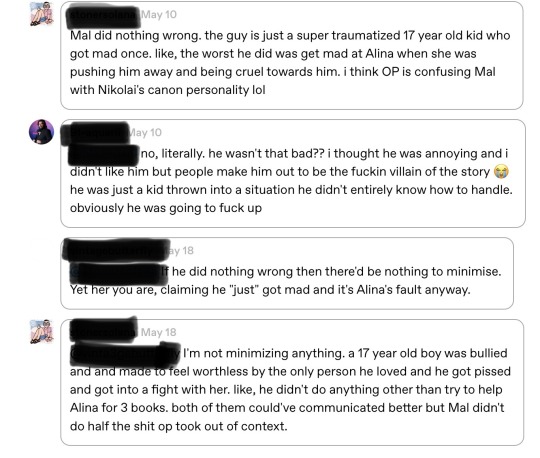
I’ve always disliked these sorts of explanations of Mal’s behaviour in Shadow and Bone. I find that there’s something reductive about framing Mal as a little hapless teenage boy who only ever got angry about justified matters and only wanted to help. It flattens him and makes him very boring to engage with. I find that this argument removes his agency and attempts to obscure the legitimate issues Mal has seemingly by characterizing him as just a “boy” who’s actions are less severe as a result of that boyishness.
Additionally, I don’t like how the commenter intentionally revises their summary of the book’s events. Mal was never bullied at the Little Palace (quite the opposite actually) and implying that Alina made him feel worthless during that time unnecessarily vilifies Alina for putting more effort into saving Ravka than her sulking boyfriend. It uses Mal’s youth as a pass for his meanness and pettiness’s towards Alina in Shadow and Bone while masquerading as a defence of a character being unjustly criticized.
In the text, it seems clear that Mal acting out is an immature response to an unfamiliar situation. He acts childish, but the issue is not the childishness itself but is instead with the way the narrative addresses it. Mal’s bad attitude towards Alina’s powers and her connection to the Darkling are validated by an ending where Alina is stripped of both as a punishment for her greed. It validates Mal’s discomfort with Alina’s new identity and somewhat justifies his cruel words to her during their arguments in Shadow and Bone and Siege and Storm. This is in conflict with the actual arguments themselves because Mal’s points in those scenes are immature and flawed but aren’t confronted in a manner that shifts the status quo.
I’d also like to add that this appeal to Mal’s youth and inexperience approaches Mal as though he is not a fictional character. As a fictional creation, Mal’s actions and words influence the overarching themes of Shadow and Bone and thus, require a resolution that addresses them. It’s not surprising that readers had such an adverse reaction to Mal when he acted like an asshole for at least 2/3 of the trilogy.
I view Mal as a character with a botched arc. I believe that his character could have been something truly compelling if we had seen his journey from a petulant and selfish boy into a self-assured young man. Mal is challenged by the revelation of Alina’s Grisha identity because it confronts him with a version of the future that reveals a diverging path. Therefore, coming to terms with his codependency and becoming his own person would allow him and Alina to reconcile and find identities outside of one another. But because this never happens, I can’t really buy into Mal’s youth being a legitimate factor in his assholery because it isn’t supported in the text and is never fully understood.
So once again:
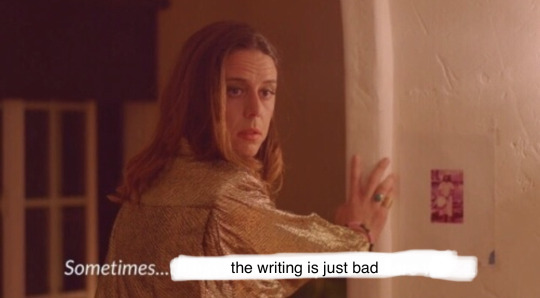
#shadow and bone#lb critical#my ramblings consume my waking thought and I can’t let this annoying ass discourse about Mal go#alina starkov#s&b critical#s&b netflix#s&b salt#anti leigh bardugo#malyen oretsev#anti malina#fandom meta#grishaverse meta#anti mal#leigh bardugo critical
109 notes
·
View notes
Text
So in short... right from the start, you never planned to focus on the Shadow and Bone side of the story?
#shadow and bone#the darkling#darklina#alina starkov#leigh bardugo critical#i wish we got the treatment this really deserved#even without a darklina ending#just a focus on the MAIN protagonist you know#wishful thinking#also wish she'd wrote an adult book not ya#them maybe readers would be treated as if they're actually intelligent...#very poor expectations management at the very least
8 notes
·
View notes
Text
How Mal and Zoya had a one night stand is beyond my comprehension. Sure, they were two pretty people but they have like no chemistry, no interesting interactions, no banther ; it was never zoya-mal, it was always zoya-mal & alina. The only thing was that they were both attractive but...i can't even see how the conversation would go, one would think "nop, this isn't working" and find someone else.
This is not a rant against the ship, the few people that actually ship them (as i have seen) are Niko/lina shippers who tolerate/ don't dislike Mal & Zoya and , very very few show! only fans , which i actually get it, Sujaya and Archie did have good chemistry (more than Book!Zoya and Mal even if they did have something) besides their personalities could go fine. I am not hating on the ship, its too small. I am more like saying that the only reason Leigh did them a thing was because there is one unwritten rule that the main girl and the rival girl always have to like the same guy. I am tagging it as "anti" just to don't bother the shippers, but lets make it clear i am not hating on it as much as Leigh´s really weird desition, which was only there for the sake of the trope.
"you only say that because you like Malina"
No, even if i don't ship it, i can reconigze that Alina/ Nikolai have good chemistry. And thats the deal actually: when an author makes a love triangle, the LI´s rival has good chemistry with the lead, but the MC´s rival hardly has any chemistry with the love interest. Why only one of them is presented as a serious contender? Is like : if the main character chooses the second option, they´ll be fine. If their love interest chooses the second option, they are making a big mistake. I wish there was more balance on this.
#anti malzoya#not REALLY#it was leigh who decided to make them with no chemistry so no one would want them together#but...I NEED SOME LOGICAL SENSE IN THINGS#zoya nazyalensky#alina starkov#leigh bardugo critical#leigh bardugo#really her writing stopped so much when she distanced herself from the cliches#malyen oretsev#mal oretsev
26 notes
·
View notes
Text
Honestly reading the familiar even makes me question six of crows cause like now I think about it, Leigh bardugo really isn’t ever bringing anything new to the table. It’s all the same formulaic YA writing no matter how she spins it and it’s definitely on the better end of the formula, I’m not saying she doesn’t have skill, but how many times can we have a plain underestimated girl fall in love with a beautiful thousand year old demon and discover she has great power and be actually interested in this?
Six of crows doesn’t follow that formula and I guess that’s why it’s so much better, but it follows the found family thing and when it comes down to it you can tell Leigh prefers kaz and it’s always so clear that the writers always prefer their male characters I’m so tired of it, when will a woman get to shine
It also occurs to me that every time I see this plain boring female character I can’t help but question if that’s how the author sees themselves? As boring? God help me give women the confidence to realize how much better they are than literally every man
1 note
·
View note
Text
The 'not so innocent' Grisha Soldiers
I'm still not over the fact the LB called the Grisha priviledged, not so innocent, soldiers. That 1:46 minute interview snippet has been running inside my mind all weekend. I had already made a rant about this here. but I still have some more stuff to get off of my chest and here is my follow-up rant.
In the Demon in the woods, by the author's own words, we can clearly see the difference between Grisha upbringing and Fjerdan indoctrination.
The book opens with a Fjerdan father telling stories to his kids. He talks about the Grisha like they are boogeymen and instills fear in his children from a young age. He also tells his kids about their saviours aka the good guys- the druskelle. And by the end of the storytime the boy dreamily states that he wants become a druskelle. Because in his eyes the druskelle are heros, holy warriors who fight to keep the cursed witches out of their lands. Druskelle are clearly glorified in Fjerda.
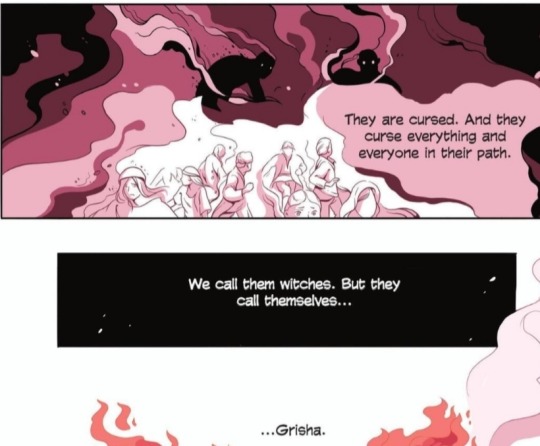
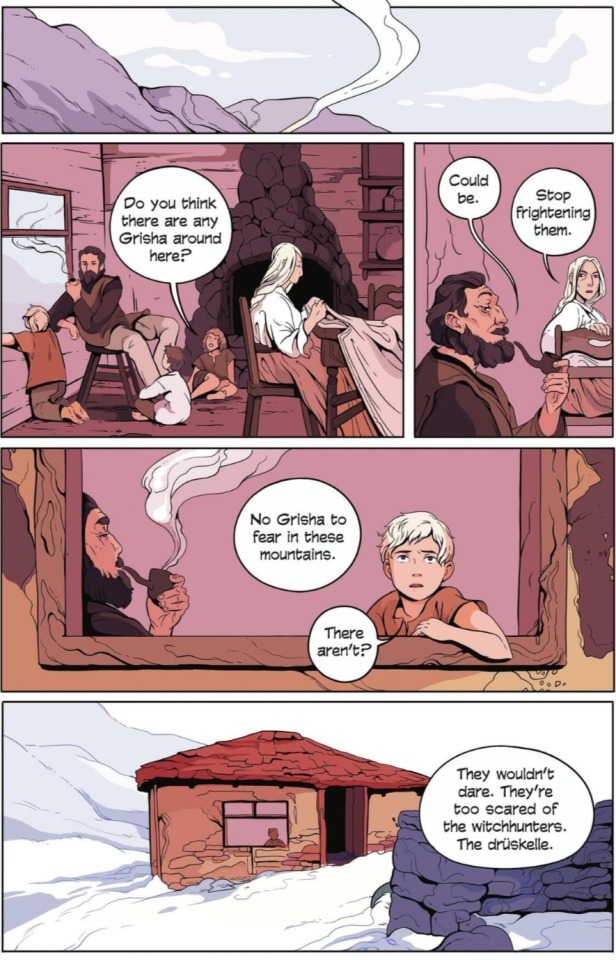
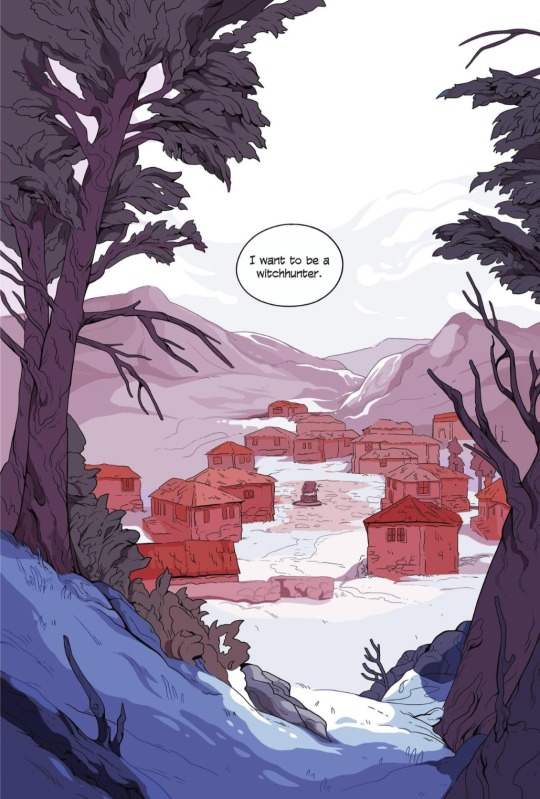
Now just look at the lessons being taught to Aleksander. He observes the otkasatzya village close by and is worried about their safety. Because the first lesson of being a Grisha is to hide from the normal folks. That does not sound very a soldier like, does it?
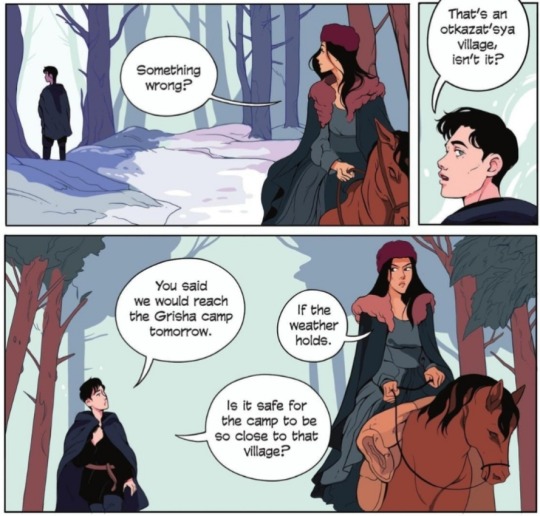
While the druskelle train to hunt Grisha, the Grisha are looking for ways to avoid a fight and move without detection. Another thing to note is that the druskelle are funded by their government while the Grisha are basically squatting in caves and forests. How can they both be called soldiers?
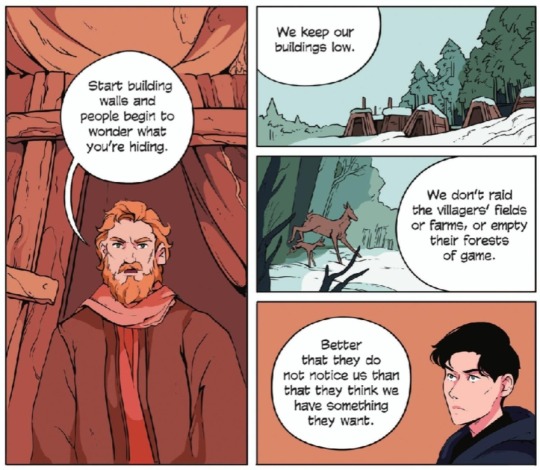
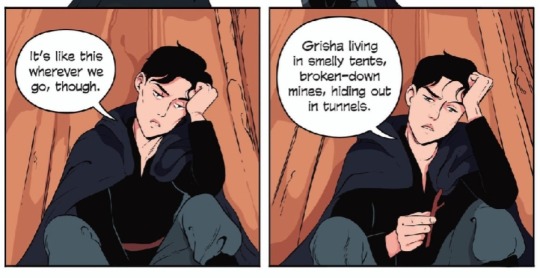

Even the peace loving Grisha are also forced to fight because if they don't they get killed.

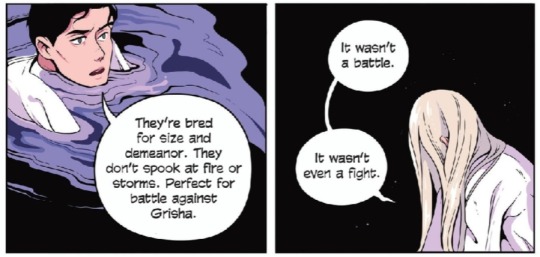
Tell me again how are they the same?
All Aleksander did was level the playing field. Or atleast he attempted to. He unified the Grisha, gave them a place to stay, trained them and taught them how to be soldiers. Unlike the druskelle, he didn't create them to invade Fjerda or take over other countries. He was merely giving them a fighting chance. And even then, we have canonically seen, the druskelle overpower the Grisha with latest guns and weaponry.
Being forced to fight and choosing to fight are two different things. The Fjerdans have options; they could let go of their bigotry and stop enlisting in the druskelle program. What options do the Grisha have? The Fjerdans are free citizens while Grisha are basically indentured labourers. So who are in the more advantageous or should I say priviledged position?
So, how can even LB suggest that the jews's crimes were merely existing while the Grisha are soldiers and are game? How can she callously say that the Grisha are not innocent and are priviledged people? Did she even write the books? She basically erased the foundation of her own universe.
That interview was an absolute disgrace. Shame on LB.

#grisha are not priviledged#druskelle and grisha cannot be equatted#the interview was a disgrace#shame on LB#grisha critical#grishaverse#poor writing#stop retconning#anti stupidity#anti leigh bardugo#aleksander morovoza#the darkling#pro the darkling#pro aleksander morozova#grisha were punished for existing
41 notes
·
View notes
Text
Not Leigh Bardugo saying the crows breaking into a hated community's safe haven and killing them just so they can traffick one of them out of that safety was her favourite part 😭 wasn't Inej like.. against human trafficking in the books? I don't think book Inej would be okay with any of this.
24 notes
·
View notes
Text
every day I think about how much better sab would have been if baghra was the villain and nikolai was another antagonist...
#baghra morozova#shadow and bone#grishaverse#sab#*sigh*#if only#godddd it would have been so good#ouaghhhhhh#i have to stop thinking about the possibilities to avoid going insane#this is how sab gets you#with all of its lost potential#leigh bardugo critical#sab critical#sab salt#it actually isn't cause this is more of a what if#but just to be safe#myramblings
242 notes
·
View notes
Text
“Drüsje,” he said with satisfaction. Witch. He had a wolf’s smile.
The attack had been a test. A girl lost in the woods cowered; she reached for a knife or a gun. She didn’t try to use her hands to stop a man’s heart. Reckless. Impulsive.
This was why Zoya hadn’t wanted to bring her. Properly trained Grisha didn’t make these mistakes. Nina had been a fool, but she didn’t have to be a traitor. She pleaded with them in Kaelish, not Ravkan, and she didn’t cry out for help—not when they bound her hands, not when they threatened her, not when they tossed her in a rowboat like a bag of millet. She wanted to scream her terror, bring Zoya running, beg for someone to save her, but she wouldn’t risk the others’ lives.
Six of Crows- Chapter 14 (Leigh Bardugo)
I wouldn't call Nina reckless or impulsive. Inexperienced, surely, but one can't expect a girl of her age and lack of education to react properly when attacked after being severely upset. She tried to defend herself on the most instinctive level and what I'd like to draw the attention to the most. ↴
Even captured, on her way to horrors unimaginable, Nina has enough sense to keep her fake persona to protect others.
I can't wait for a flashback enlightening us on why would Nina put so much faith in Zoya. Why she looks up to her so much. Why she believes Zoya would run to save her (aside from being weak and lacking compared to her). Perhaps the Squaller didn't want to bring her at first, but she allowed it, AND she's been the reason Nina ran away, constantly bringing her down. She's the one to blame, not worship.
#Grishaverse#SoC Chapter 14#Nina Zenik#Zoya Nazyalensky#grishanalyticritical#Six of Crows#Six of Crows duology#V#books#quotes#Leigh Bardugo#anti Zoya#I'm gonna criticize Nina A LOT#but this one deserves a slow clap of appreciation.
24 notes
·
View notes
Text
In the prologue, Alina explains she never finishes her food because it tastes like mud. When Mal says it tastes fine to him, she simply teases him by saying he will eat anything.
I find this particular interesting for two reasons:
It could possibly mean she used to eat good food before going to the orphanage, or something of a decent quality. However, we know nothing of her parents or origins other than her birthplace which happens to be a battlefield between Shu-Han & Ravka, leading me to believe they were most likely trying to survive day by day, saving money and food.
Or, the suppression of her powers (and her sickness) comes from before Mal. We know the Duke's orphanage is not the best environment to grow but surely he could give them access to good ingredients as far as I remember. Sweet girl, why aren't you eating?
#Sasha Rambles#Leigh Bardugo Critical#sab critical#alina starkova#alina starkov#Rereading S&B#why not#I have nothing better to do
10 notes
·
View notes
Text
Shadow and Bone and Nimona have striking similarities, especially where the Darkling and the Grisha are concerned. I love seeing an allegorical piece of work that actually properly addresses the corrupt power structures instead of inadvertently supporting them at the cost of vilifying and stereotyping an entire race of outcast people considered monsters. Especially because it really delves into what such prejudice does to a person, like Nimona and the Darkling - and Ballister as well. Where Shadow and Bone failed, at least Nimona succeeds.
#shadow and bone#the grisha trilogy#sab critical#the darkling#aleksander morozova#sab meta#leigh bardugo critical
84 notes
·
View notes
Text
We’re going through this phase of fandom right now where people willfully ignore the sexist implications of female characters being shafted into housewife/mother roles or disempowered by the end of their stories. If you dare to criticize such writing decisions, you will be accused of sexism and be hounded for not “respecting their choices” as though these characters are actual people and not tools of storytelling. As if the cliche of female characters “sacrificing” their powers or having them stripped away exists in a vacuum and isn’t influenced by any larger cultural factors.
They’ll say: “Not every character has to be a girlboss!!” Or “Let women be soft and traditional!!” As if that’s some revolutionary way of thinking and not the norm. It’s an extension of choice feminism, dismissing any dissent about the quality of the narrative to make it make sense and avoid the uncomfortable truth. Diminishing the agency of female characters and cramming them into traditional roles is a common occurrence in many stories, and we should be allowed to criticize them without being silenced.
#you already know what I’m talking about#shadow and bone#alina starkov#lb critical#anti leigh bardugo#katara deserved better#pro katara#nesta archeron#anti sjm#acosf#choice feminism#anti bryke#anti Kataang#s&b critical#pro Nesta
585 notes
·
View notes